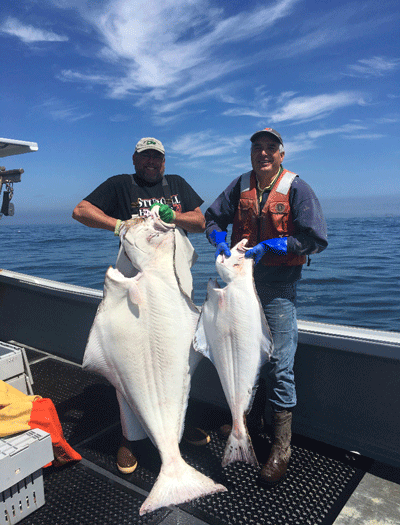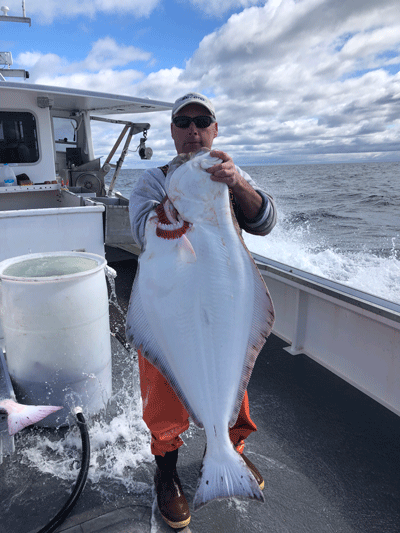“Once you’ve caught a halibut, you’ll never be the same, if you like fishing,” said Erik Waterman, a commercial fisherman who lives in South Thomaston and fishes out of Spruce Head.
Waterman was talking about wild-caught Atlantic halibut, one of the largest fish in the Gulf of Maine and the largest species of flatfish in the world.
Usually he’s out trapping lobsters. But he’s fished for halibut since 1999 and looks forward to the state’s short halibut fishing season, which this year takes place from May 18 through June 13.
“You’re not really doing it for the money,” he said. “It’s more of an obsession.”

It’s a different experience and a thrilling fishery, Waterman explained. These are huge fish. Living up to 50 years, they can be up to 15 feet long. Full-grown females average 100 to 150 pounds, although individuals weighing 600 to 700 pounds have been landed, according to the National Oceanic and Atmospheric Administration and Maine Department of Marine Resources.
Some might consider them odd-looking. As a “flatfish,” their bodies are compressed and both eyes are on one side. Their large mouths are armed with sharp, curved teeth.
The halibut population is a remnant of what it once was, but strict regulations with gear, size, season, and catch restrictions allow for a limited fishery. In state waters, fishermen may land 25 halibut during the one-month season.
Several types of gear are allowed. Waterman uses bottom longlines equipped with circle hooks designed to certain specifications meant to target allowed fish sizes and to prevent the fish from swallowing them. Often, he gets one to four fish per day. Steaming five to 15 miles offshore, he usually sets his lines in the morning, then returns the next morning to haul them.
Halibut are fighters.
“It would be the equivalent of going fly-fishing in the river and catching a three-pound salmon or trout,” he said. “It’s not really a commercial thing. I take my kids out. I take friends out. The money for the fish is just a bonus. It’s my trout fishing on the ocean.”
“I’d agree with that,” said Gerry Cushman of Port Clyde. “There’s nothing like the excitement of a halibut on the end of a line. You get guys screaming and hollering.”
He added, “It’s just such a beautiful creature.”
Cushman, a fifth-generation fisherman, holds a federal permit, so he isn’t constrained by the season in the same way that state fishermen are. He can harvest halibut year-round, but typically only targets them in the spring, also using longlines with circle hooks. He’s allowed one halibut per trip, no matter the length of the trip. He’ll go as far as 10 miles offshore to find a good bed of the bottom-dwellers, which prefer sand, gravel, or clay. Halibut, he noted, can’t usually be detected with a sonar device called a fish finder, so he just looks for likely seabeds.
“I think they like bottom they can blend into,” he said.
A couple of years ago he found a bed that yielded 19 keepers over the course of the season.
“There are certain areas where there’s halibut every year,” he said. “And there’s bottom where they had been, and then you go back and they’re not there. But they’re not far from the original spot.”
Cushman’s largest halibut weighed 118 pounds.
Both he and Waterman sell their hauls direct to local markets.
“From my deck to their door, there’s no middleman and it’s fresh off the boat,” said Waterman.
“The great thing about halibut is that, if you live in Maine and you see fresh halibut on the menu and in the market, it’s fresh,” said Cushman. “Everything’s seasonal when it comes to fishing. I tell people, You want to enjoy it while it’s here.”
Halibut has a mild, sweet taste. When cooked, the meat is firm, yet flaky and tender.
So how do fishermen cook it?
“I like it blackened,” said Cushman. “Sometimes we just grill it with a little butter and some parsley. Halibut is one of those fish where it’s just fantastic on its own. And it’s good for you.”
“You can fry it, you can bake it. I like it grilled,” said Waterman. “There are so many things you can do. It’s very versatile.”
He added, “I’ll fillet or steak them and give it away. I call it fish karma. My neighbors love me.”





